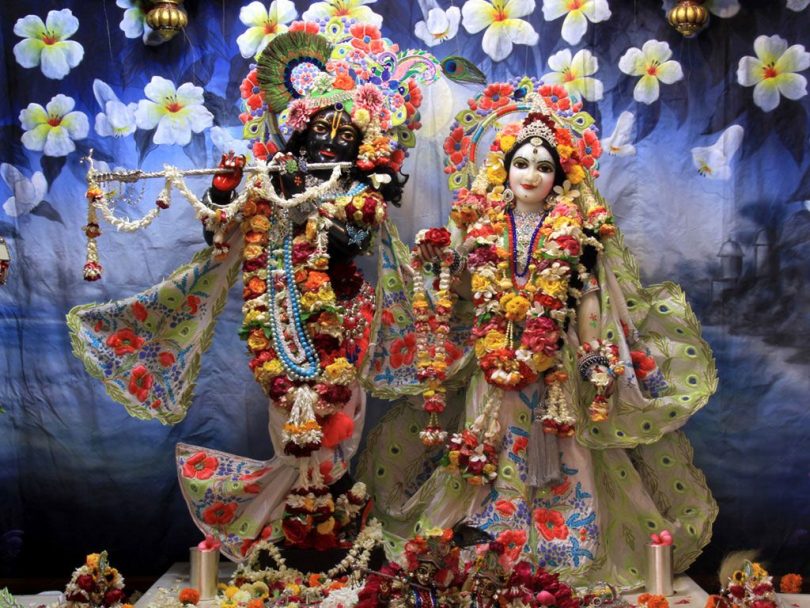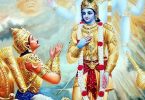Question: What do we know about the marriage of Rädhä to Abhimanyu? Was this performed during the time of the gopas being married to all the gopis, during the one year that Kåñëa manifested as each of the gopas?
Answer by Romapada Swami:
We find in SB Canto 10 Chapter 13 that for one full year Kåñëa manifested forms of each gopa, to satisfy the intense desire of the gopas’ mothers to have Kåñëa as their son.
We find in Garga Samhita 2.8.11 that the young gopis were married to these gopas during that one year’s time. Translation: “Then the millions of gopé girls, who were all deeply in love with Kåñëa, were married to the many gopa boys, who at that time were all forms of Kåñëa.”
NOTE: This gives us an idea how many gopas there were in Kåñëa’s daily cowherd pastimes!
However, the marriage of Rädhä to Abhimanyu apparently did not take place at that time – unless we are hearing of pastimes from two different kalpas; her marriage to Abhimanyu apparently took place sometime after the Çaìkhacuòa pastime, according to the references below from Rupa Goswami’s dramas Lalita Madhava and Vidagdha Madhava.
2nd NOTE: There is no mention I could find which indicates why Rädhä, Kåñëa, and Balaräma were not married during the one year when all the other marriages took place. One simple solution is to assume that Yogamaya somehow made this arrangement, and nobody made an issue about it for the same reason.
Lalita Mädhava –
Act 1, Scene 1, Text 2
Gärgé to Paurnamasi: O noble lady, you yourself arranged Rädhä’s marriage with Abhimanyu.
Act 2, Scene 1, Texts 15 & 17
Paurëamäsé: Keçé saw the transcendental glory of Rädhä and Mädhava (Kåñëa), and he then accurately described it to King (Kaàsa). Kaàsa then decided to invade and capture Gokula to get Rädhä. Ariñöäsura then advised Kaàsa to marry Rädhä, and the fearless Kaàsa sent his intimate friend, the wicked yakña Çaìkhacuòa, to kidnap her.
Vidagdha-Mädhava – Act 1, Scene 1, Texts 13-15
Text 13 (a)
Nändé [Nändémukhé]: Noble lady, if you are destined to arrange Våñabhänu-nandiné Rädhä’s meeting with Lord Kåñëa, then why did Rädhä leave the land of Gokula, which is so favorable for that meeting, and secretly reside in the sacred village of Çäntanu-väsa?
Text 13 (b)
Paurëamäsé: Because She fears cruel King Kaàsa, my child.
Nändé: Noble lady, how did the king learn about Rädhä?
Text 13 (c)
Paurëamäsé: He learned about Rädhä’s great beauty in this way: Even if one carefully hides it, musk’s sweet scent at once reveals where it is. In the same way, even though they were carefully hidden, Rädhä’s beauty and virtues became known everywhere.
Text 14 (a)
Nändé: Noble lady, Yaçodä’s nurse, Mukharä, brought her granddaughter Rädhä to Gokula. Rädhä then accepted the hand of Abhimanyu, the son of Jaöilä, in marriage. A more unsuitable match could not have been made! Rädhä cannot tolerate the touch of the hand of any man other than Kåñëa. O mother, how can you remain aloof when this is happening?
Text 14 (b)
Paurëamäsé: Why should I care?
Nändé: How can you talk like that?
Paurëamäsé: (laughing) This false marriage of Rädhä and Abhimanyu is simply a trick that Yogamäyä has played to cheat Kaàsa. Rädhä and all the other gopés are Kåñëa’s lovers eternally.
Nändé: (joyfully) And now that Rädhä has returned to Gokula, you are free of all worries.
Paurëamäsé: Child, what you say is true. My worry about Kaàsa is now less, although now I am beginning to worry about Abhimanyu.
Nandi: Why is that?
Text 14 (c)
Paurëamäsé: Noticing that the black bumblebee of Kåñëa is fond of playing among the new-flowering vines of the gopés, Abhimanyu has become jealous. Now he desires to take the golden lotus flower Rädhä to another forest.
Text 15 (a)
Nändé: Now Yogamäyä will act.
Paurëamäsé: Daughter, independent Yogamäyä now stands aloof. Who understands her actions?
Text 15 (b)
Nändé: Is there another way to stop him?
Paurëamäsé: Child, simply by speaking sweet and clever words, I will stop shallow Abhimanyu.







